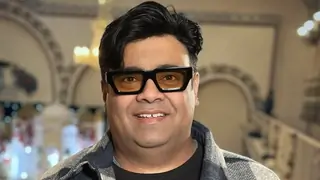He mentioned one of his experiences with Balika Vadhu. IPL was going on, and the producer wanted to create some hype to get TRP back. He asked Purnendu to bring some later scenes in the story much earlier to the screen, to create an interest. Purnendu rewrote the script accordingly, and devised a scene where Anandi gets hit by a bullet in her stomach. When Purnendu watched that episode on the TV, he was taken aback to find that they have shown that Anandi got hit by the bullet in her head.
It became a critical situation for him. It is implausible that someone would be alive after getting hit by a bullet in the head. The later story had already been planned. But, if he would show Anandi alive now, that might look too farfetched.
This dilemma pressed him to research. After extensive research on the net, and speaking to doctors, Purnendu found out that there was one such case in reality, where the person lived for 8 years after he was hit by a bullet in the head. But the doctors did not remove the bullet from that person's head. Had that been removed, the person might have died instantly.
There was another problem connected to this. If the doctors operate the brain, they must shave Anandi's hair. So, Purnendu researched again and found that sometimes doctors shave only a small area in the head where the operation is done. Hence, the patient can keep rest of the hair as it is. In the serial, this translated to covering up Anandi's forehead with a bandage.
Dialogues are very important in any TV series. The Television, as a medium, reflects the daily dregs of the common man's life. Dialogues, conversations, take maximum share of his social existence.
However, in cinema, the sensational, spectacular, larger than life nature of the medium works in a different way to draw the spectator into the screen. It is action, not dialogue, that speaks. Cinema uses dialogues sparingly, mostly for detailed characterization, or as spices to the visual story.
Purnendu does not write dialogues himself, He works in collaboration with dialogue writers. It is a problem if the dialogues do not match the visual emotions and patterns penned by himself. As a result, the audience may see a change in the character's attitude for no reason.
Although no method is full-proof to get rid of this problem, Purnendu recommended long brain-storming sessions with the dialogue writer before each episode.
For actors, he suggests a through script reading. Actors must understand their characters. They should fit themselves in the character's shoes.
Purnendu always sits with his team of writers, and tries to find out the problem if a series stops working. TRP is always the notifier.
"We should never compromise on the content. If we do so, the story will become monotonous, leading ultimately to diminishing TRPs. So, it is imperative to change it when there is time."
He believes in providing entertainment with a purpose. He also feels that the emotional disturbances a woman can go through, a man cannot. As he always makes the central character emotionally strong and vibrant, he has chosen only female protagonists so far. He puts them in difficult situations, and sees how they cope up.
In Baalika Vadhu, it shows phases of puberty in a girl's life - when she transforms from a girl to a woman. In this age, a girl should be with her mother who could explain the changes to her. But, by the time she reaches puberty, Anandi is already married, and away from her parents. Although the Mother-in-Law is traditionally like a mother, she is not a replacement
With his series getting higher TRPs every week, Purnendu feels that he is playing an active role in reshaping the society, for the new generations. This to him is the highest award a writer craves.

































